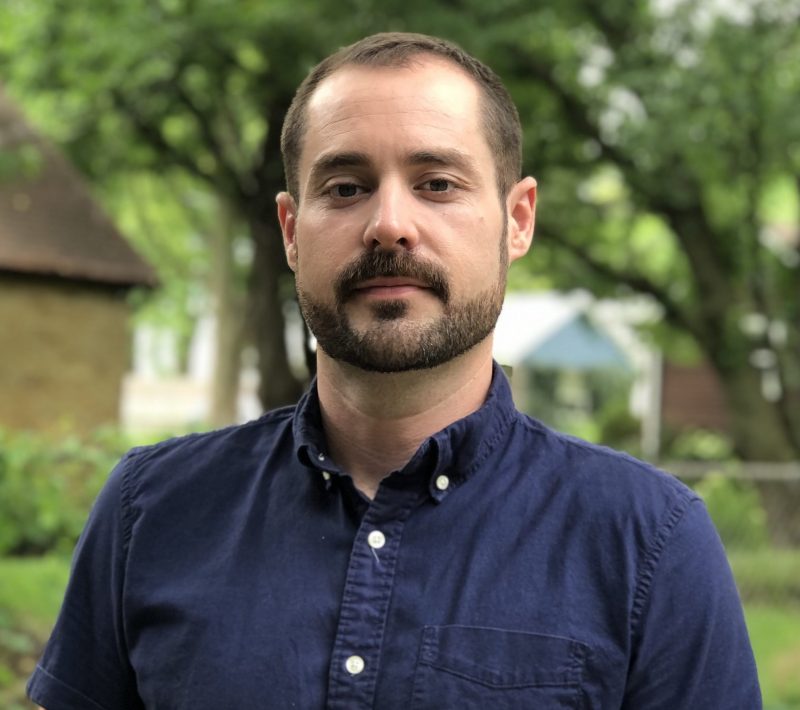Joe Coyle, PhD candidate in Anthropology, is a 2021–22 HRI Graduate Student Fellow. Coyle’s dissertation project, Queer Pentecostal World-Making in an Uncertain Brazil, ethnographically analyzes the emergence of LGBTQ+-led Pentecostal churches and queer Pentecostal identity formation at a time of increasing moral conservativism in Brazil. Learn more about HRI’s Campus Fellowship program, which supports a cohort of faculty and graduate students through a year of dedicated research and writing in a collaborative, interdisciplinary environment.
What is unique about your research on this topic?
Pentecostalism and queerness are both often understood as excessive: as unruly, spilling out of embodied composure, too sensuous, too loud, too much. When described in a pairing, though, these terms are often placed in contradistinction: they repel one another, they are each other’s opposites, one invested in gendered and sexual normativities, and the other normativity’s unraveling.
My dissertation project Queer Pentecostalism in an Uncertain Brazil tracks the ways queerness and Pentecostalism are lived together, not just in resonance or contradiction with one another, but through the much more messy and uncertain space where queer Pentecostal life is actually lived.
“I think of anthropological method as the art of being in relation with others, and ethnographic description as the art of writing those relations. It’s a difficult art, stepping into other people’s lives and describing the relations you think you see.”
It is true that the combination of Pentecostalism and politics in Brazil often has anti-queer and anti-trans aims. And all of the queer Pentecostals I know have experienced some form of this life-negating force. But my dissertation also attends to the ways Pentecostalism provides necessary spiritual, affective, life-affirming resources to get through the day and imagine a better world, something beyond the here and now of Bolsonaro’s (or anybody’s) Brazil.
The growth of LGBTQ-led Pentecostal churches in Brazil since the early 2000s has provided necessary resources for people to reconcile identities that were formerly forced into unnecessary opposition. Yet, these “inclusive” spaces can also be experienced as exclusionary of many forms of minoritized difference. And so some queer Pentecostals imagine a queer Pentecostalism to come, through practices like Pentecostal drag, participation in political efforts like the Bancada Evangélica Popular, or through the quotidian practices of everyday life outside of church institutions—you can feel the Holy Spirit anywhere, after all.
What drives your interest in this research?
A lot of what drives me as a scholar are the related questions of method and description. I think of anthropological method as the art of being in relation with others, and ethnographic description as the art of writing those relations. It’s a difficult art, stepping into other people’s lives and describing the relations you think you see. At its worst, it’s extractivist and disavows the relations that comprise its own place of speaking. At its best, it tries to acknowledge bias and find ways to be accountable to the lives upon which it relies. What’s enough? What happens and what’s at stake in the various kinds of relation we (anthropologists, anybody) inhabit and describe?
Entering into any relation with someone can be like this: it’s exciting, confusing, uncertain, full of misperception and projection, but also understanding. It breaks down. It’s full of swerve and possibility. And it’s also banal, ordinary, unremarkable. It exceeds categorizing in some sense, but it is also always structured through positionality, power, and purposes that do not usually line up in tidy order.
I like that anthropology attempts to speak of relations in the actual existing social world (and at its best is also invested in challenging some of the harmful ways this world is organized), but at the same time (again, at its best) is anxious over what it means to speak from here about anything.
Maybe anthropological method and ethnographic description are best understood like the way David Eng, Jack Halberstam, and José Esteban Muñoz understand the operation of the word queer: that it “can neither be decided on in advance nor be depended on in the future.” Of queer studies they write: “that queerness remains open to a continuing critique of its exclusionary operations has always been one of the field’s key theoretical and political promises.” We cannot guarantee “has always been” for the field of anthropology, its critique of its own methods and projects, but hopefully we can land on “has increasingly become.”
Eng, David, Judith Halberstam, José Esteban Muñoz. “What’s Queer About Queer Studies?” Social Text 84-85 (2005).
